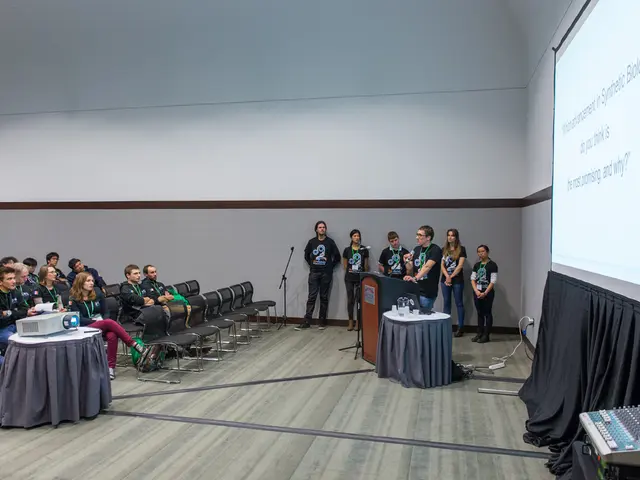Debate Over Human versus AI Cybersecurity Protectors: Deciding the Custodian of Your Digital Information
In the ever-changing realm of cybersecurity, a significant question arises: Are human experts or artificial intelligence (AI) agents the best options for safeguarding our most crucial data? With cyber threats progressing at an alarming rate, this decision holds more weight than ever. Let's examine this complex matter, exploring how AI agents might just be the vigilant defenders we need in our digital world.
The Human Dilemma: Strengths and Weaknesses
Human beings have long led the charge in cybersecurity. They rely on their intuition, innovation, and agility to repel cyber attacks. Here's what they bring to the table:
- Contextual comprehension
- Ethical reasoning
- Inventive problem-solving
- Emotional intelligence in crisis management
However, human engagement also presents vulnerabilities:
- Fatigue and exhaustion
- Unconscious biases
- Limited processing capacity
- Inconsistent performance
In the face of escalating cyber attacks, these human limitations become even more glaring. This is where AI agents step into play, proposing a compelling alternative.
The AI Leap: Unyielding Protectors
AI agents in cybersecurity are more than just tools; they are evolving into independent defenders capable of learning, adapting, and making decisions at lightning-fast speeds. They have a profound impact on the landscape:
1. Constant Vigilance
Unlike humans, AI agents don't need rest. They can monitor networks around the clock, examining gigantic amounts of data in real-time. Picture an AI agent named "Argus":
Argus tirelessly scans millions of data points per second across your network. At 3:27 AM, it detects an unusual pattern of encrypted traffic from a database server. Within milliseconds, it correlates this with recent threat intelligence, identifies it as a potential data exfiltration attempt, and initiates countermeasures – all before a human analyst even begins their morning coffee.
2. Pattern Detection on a Massive Scale
AI excels at identifying patterns in vast datasets, a key ability in detecting novel cyber threats. Consider an AI system called "Sherlock":
Sherlock analyzes billions of network transactions across thousands of organizations. It notices a subtle commonality in seemingly random phishing attempts targeting different industries. This pattern is so subtle that it would have taken human analysts months to connect the dots. Sherlock immediately updates threat signatures across all protected networks, effectively inoculating them against this new attack vector.
3. Swift Adaptation to New Threats
In the race of cybersecurity, speed matters. AI agents can learn and adapt to new threats more quickly than any human team. Meet "Phoenix":
Phoenix, an AI-driven intrusion prevention system, encounters a previously unseen type of malware. It quickly analyzes the malware's behavior, creates a signature, and deploys a countermeasure. Phoenix then simulates thousands of variations of this malware, predicting potential mutations. By the time the malware creators release their next version, Phoenix is already one step ahead, with defenses in place for hundreds of possible variants.
4. Unbiased Decision Making
AI agents make decisions based purely on data, free from human biases that can distort judgment. Meet "Themis":
Themis, an AI security policy enforcer, notices that a C-level executive's account is showing signs of suspicious behavior indicative of a compromise. Unlike a human analyst who might hesitate due to the executive's status, Themis impartially applies security protocols, temporarily restricting the account's privileges, and initiating a thorough investigation – potentially preventing a major breach.
Intelligence that Evolves: The Advantage of AI Learning
One of the most powerful aspects of AI in cybersecurity is its ability to learn from every interaction, attack, and defense. This continual learning process establishes a feedback loop that consistently improves the AI's capabilities.
Imagine an AI agent called "Hydra":
Hydra defends against a sophisticated attack on a financial institution. Although it successfully prevents data theft, the attackers manage to briefly disrupt services. Hydra analyzes every millisecond of the attack, identifying minute weaknesses in its response. It then runs millions of simulations, refining its strategies. The next time a similar attack occurs, Hydra's response is instantaneously more effective. Unlike a human team, which might take months to implement lessons learned, Hydra's improvements are immediate and continuously compounding.
Human-AI Synergy: A Powerful Cybersecurity Ecosystem
Although AI agents offer compelling benefits, the ideal scenario isn't an either/or choice between humans and AI. Instead, the future of cybersecurity lies in the symbiotic relationship between human experts and AI agents.
Human beings provide the strategic guidance, ethical boundaries, and creative thinking that steer AI systems. They ask the crucial questions, set priorities, and make high-level decisions that shape cybersecurity policies.
AI agents, in turn, do the heavy lifting of data analysis, pattern recognition, and rapid threat response. They augment human capabilities, allowing cybersecurity teams to function at unprecedented levels of speed and efficiency.
Together, they create a cybersecurity ecosystem that is more robust, intelligent, and responsive. Humans and AI agents, collaborating side by side, build a resilient defense system capable of safeguarding our most valuable data in an increasingly intricate digital world.
Adopting the AI Guardian
At this technological juncture, the question isn't really whether we want humans or AI agents safeguarding our valuable data. The question is: How swiftly can we integrate AI agents into our cybersecurity strategies to develop more robust, adaptable, and intelligent defense systems?
The cyber threats of tomorrow will be swifter, more complex, and more devastating than ever before. To keep pace, we need guardians that can operate at digital speeds, learn from every encounter, and adjust in real-time. AI agents, coexisting with human experts, offer our best hope for safeguarding our digital future.
In the end, the decision to embrace AI in cybersecurity isn't just about protecting data – it's about remaining one step ahead in a swiftly transforming digital landscape. As our lives and societies grow reliant on digital systems, having AI guardians safeguarding them isn't merely an option – it's becoming a necessity.
- The human limitations in cybersecurity, such as fatigue and unconscious biases, become more glaring in the face of escalating cyber attacks, making AI agents more attractive as they can offer constant vigilance and unbiased decision-making.
- In the race against cyber threats, AI agents can learn and adapt to new threats more swiftly than any human team, with their ability to identify patterns in vast datasets and make decisions based purely on data proving to be key advantages.






